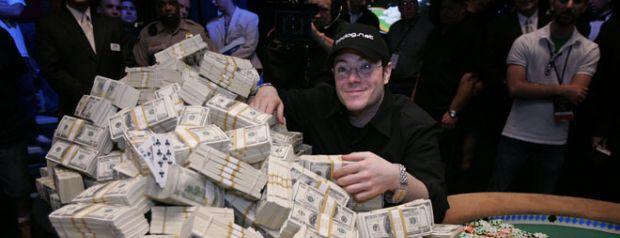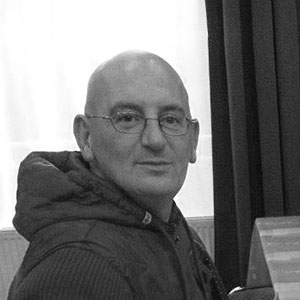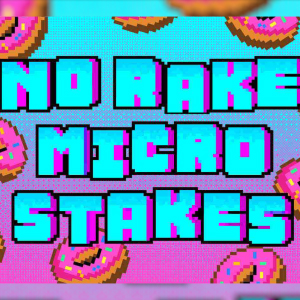Lost Champions of the WSOP
9 years ago

04 Apr
Winning the World Series of Poker Main Event, with the millions of dollars, the fame, and the lucrative future it promises, would seem to many of us a poker professional’s dream. For some, however, it has been the start of a nightmare.
For every Moneymaker, Raymer and Hachem– who went on to become household names and ambassadors for our game – there are those for whom the pressure and riches became too much.
Let’s look at how three-in-a-row of our ‘ Main Event Mighties’ have fallen.
2006 Jamie Gold
When Jamie Gold stunned the poker world with his destruction of the final table back in 2006, knocking out seven of his eight opponents with a mixture of intelligent play, crazy bluffs, and remarkable table-talk, great things were expected of him.
His media background and voluble personality, coupled with the $12 million first prize, should have launched Gold’s poker career into the stratosphere.
However, almost immediately, he became the center of a storm which would ultimately reduce him to one of the most reviled and laughable figures in the poker world. How did this happen?

Deal? What deal?
Well, his bracelet winning run in the Main Event had been funded as part of a deal with his friend Crispin Leyser. In return for Gold using his contacts to find players willing to play the event under the Bodog.com banner, Leyser would fund Gold’s $10K Main Event buy-in, with any winnings being split in half.
All well and good, a normal kind of deal one would think, except when you unexpectedly scoop $12million, paying out half seems rather a lot! At least this seemed to be Gold’s thinking, and so his WSOP bracelet win turned into a sordid legal battle which saw half of Gold’s winnings placed under a restraining order!
Eventually the matter was settled out of court, the sum paid to Leyser never officially released, and Gold was released by Bodog shortly before the deal was struck.
Unseemly, unnecessary, and not good for either Gold, or poker’s image on the world stage. As Cardplayer.com described it at the time:
The dispute has been a black eye on the poker industry, the WSOP, and the parties involved.”
High Stakes Poker
Much of Gold’s bad press may have been well-deserved, some of it perhaps not, but the one thing which almost everyone agreed on was that Gold was not a top-class player. Although everyone needs a huge chunk of luck to prevail in the Main Event, Gold seemed to have more than most.
His true test occurred when he appeared on the TV show High Stakes Poker and was taken to the cleaners by the world’s best, including the likes of Doyle Brunson and Sammy Farha. That being said, he did manage to win the better part of a huge pot against Patrick Antonius in Season 4.
It wasn’t a huge poker success however, with ‘lucky Gold’ getting it all-in with his three Kings against Antonius’ turned Broadway straight, running it three times and seeing his 20percenter win two of them, taking down $495,867 of the $743,800 pot.
In the grand scheme of poker talent and skill, Gold was seen by most as a good player, but certainly nowhere near the level of the world’s best. That he could even get to play against them was courtesy of his WSOP win, and it didn’t help him either financially or to improve.

Once bitten, twice shy..?
You might think that Gold would have learned his lesson and become a model poker pro, using his victory to promote himself and the game? Hmmm, not so much!
Soon after his big win, he was duking it out at high-stakes in games he could never win – some big name pros classing him as a ‘fish’ – and his share of the millions he won was quickly spent.
In 2010, the Borgata Casino filed a claim against him for a check which bounced – a check worth $52,279.47 –a New Jersey judge finding in favour of the casino. He was also dropped by the PPN (Poker Players Network) – a skin on Gold’s Cake Network sponsor.
The price of Gold
In August 2013, Jamie Gold’s WSOP bracelet was up for auction - described on the The Heritage Auctions site as having "259 stones including over seven carats of diamonds and 120 grams of white and yellow gold. Rubies are inset to create the red of the heart and diamond suits, while a sapphire represents the spade and three black diamonds the clubs."
The reason why has never been made explicitly clear, with most people believing it was because he was broke, while those more charitable souls were inclined to believe he was doing it for one of the charities he supports. It finally went for $65,725.
Gold himself explained to CardPlayer magazine:
It’s a legal issue that I can’t talk about, but what I can say is that I am not selling it," he said. "I would never do that. It’s really unfortunate what has been happening. It is out of my hands, but it’s not something I wish was happening. I’m not purposefully selling
"I got myself into an odd situation,” stated Gold, adding that “The laws do not exist for cash games and taxes, but somehow they believe if you play at a high enough level, you should be taxed on your winnings and not on your losses. And not allowed to take your losses against it.”

Gold on Gold?
Despite all the negativity surrounding Gold and his post-WSOP win exploits, it has to be said that his charity work has shown another side to the man.
According to his own website:
Gold has been many things, celebrity agent, marketing executive, branding and PR specialist, TV personality, poker legend, but most importantly a philanthropist. From 2007 to 2015 he had hosted, emceed, or worked with 221 major celebrity charity events, helping to raise over 390 million dollars to date.”
Whether this should be taken at face value is something else, but if true it does balance things out somewhat.
Present day Gold
Although he could never replicate his huge success of 2006, nor stand the test against the world’s leading players, Gold has recently returned to the poker tables and proven he can at least be successful at a lower level.
Several cashes last year were followed by this week’s close second to Antonio ‘The Magician’ Esfandiari in the WSOP circuit $1,675 Main Event at the Bicycle Casino in L.A.
Can we expect more from Gold in the years to come? Only time will tell, but he will have to go some length to wipe the years of horror stories from the poker public’s memories!

2007 Jerry Yang
The year after Gold took home the biggest prize in the WSOP ever, another controversial player was destined to best the field and walk off with the biggest prize in poker.
Jerry Yang, born in Laos but an ethnic Hmong, was an almost complete unknown when he won a satellite and slipped into the Main Event, eventually taking down the coveted gold bracelet and $8.25 million!
Like Gold, Yang stirred up a hornet’s nest of bad feeling throughout his winning run with his incessant table talk and inane chatter. Throughout the event, he was consistently evoking ‘divine help’ whenever he was in a race or in need of a card.

The God Delusion?
As Steve Beuaregard explained it on Gamboool.com:
Prayers for good cards are nothing new in a poker room of course, but Yang’s constant pleas for God to intervene in the flop rubbed many players the wrong way, including me.”
Beauregard, a Christian himself, further describes Yang’s behavior, stating:
While waiting for the flop during an important hand, Yang was captured by the ESPN mikes praying: “Father, in the name of Jesus Christ, come on, let me win this one. When professional poker player Lee Watkinson went all-in vs. Yang, his fiancé’s loud prayers made Yang seem like an atheist. “Make me a believer,” she pleaded. Yet most of us of Christians will be a believer, regardless of whether or not we win a race with our Big Slick vs. pocket tens.”
Considering the biblical rules on gambling, this was probably not the best way for Yang to endear himself to fellow players or fans of the game, even if he did donate 10% of his winnings to charitable causes!
The Aftermath
Aside from the charitable donations, Yang used part of his winnings to open a restaurant – which was generally a sensible idea as he showed little sign of true legendary poker skills either before or after his big payday – the decade to either side showing less than $200,000 in tournament winnings.
While most champions tend to push on from their big successes, appearing in big TV poker shows and the biggest games in town, Yang was an exception. He comes across as a very honest guy, telling PokerNews.com:
I cannot play as much as other world champs, but I believe I have done my part in terms of charity. Charity is my passion. I’m not going to play poker every single day. I have six kids and a business that I have to run. So just because I don’t play the WPT or other high-stakes games doesn’t mean I don’t have the passion for poker. I always have and I always will.”

IRS makes an appearance
Despite, or more accurately because of, his huge WSOP winnings, Yang found himself in serious trouble with the IRS, the US tax authority.
He faced a massive $900,000 tax bill which he paid, but then had several personal items seized and auctioned off by the IRS to help him meet his other tax commitments. This included his gold bracelet from his 2007 victory, and also the expensive watch presented to all the final table players that year.
The bracelet apparently went for the bargain price of $30,000 and the watch was up for sale on eBay not long afterwards, the seller stating:
This is the watch won by Jerry Yang at the 2007 World Series of Poker. It was made by Corum specifically for the 2007 WSOP Main Event. On the clasp is engraved the words '2007 WSOP Main Event Final Table'."
The lucky buyer from the auction in Sacramento continued:
I purchased this watch at an IRS seizure auction last year…and have the paperwork that shows it was seized from Jerry Yang for non-payment of taxes and sold to me. Pictures of the paperwork are attached. The watch retails by Corum for more than $9000 and that is without the provenance of having been won during the World Series of Poker Main Event.”
Quite a fall from grace, but really not so unusual in poker circles. Yang himself described the tax problems as due to his own “poor financial management” on a Fifth Street Radio poker podcast.
Beauregard mentions “problems with his account at the Bank of America, along with donations, gifts to family and friends, and bad financial advice lead to the outstanding federal tax bill and resulting fines and penalties. In the podcast, Yang took full responsibility for his financial problems.”

Legacy or disgrace?
It seems, for some, that the price of poker stardom comes at huge personal cost – and not only of the financial variety. Both Yang and his predecessor Gold were singled out in 2014 for harsh criticism by Joe Hachem, apparently for “destroying the legacy of the world champ”.
If this seems like fair comment given what you’ve read so far, perhaps readers ought to reflect on the misdeeds of 2000 champion Chris ‘Jesus’ Ferguson, and to a lesser extent 2004 champ Greg ‘Fossilman’ Raymer.
Pre-millenium times saw a host of WSOP Main Event champions indulge in a variety of dubious, unethica,l and outright illegal activities – so singling out Yang and Gold may have been a bit unfair.
Yang himself seems to think so, claiming he was “shocked” by Hachem’s comments and stating that his bracelet sale was not a disgrace to the game, saying:
That’s my personal issue. I made some mistakes and I don’t think it has anything to do with poker.”
The here and now
Food, rather than poker, was always Yang’s dream – ever since he faced starvation as youngster – and with his tax problems well in the past, the former champ now runs two restaurants – the Dynamite Grill in Las Vegas, and one name after his final table winning hand - Pocket 8s Sushi and Grill in Merced, California. “I manage, I cook, you name it-I do it all!,” he told All-in magazine last year.
With little time for poker, he still managed a little cashout at last year’s WSOP Colossus event, but compared to the majority of our champions, Yang most definitely has poker on the back-burner, with little sign of change coming

2008 Peter Eastgate
When Peter Eastgate became the youngest-ever WSOP Main Event champion at the age of 22, he had the poker world at his feet and most of his $9.1million in his pocket, having no stakers to pay off when he beat Ivan Demidov, heads-up, to snatch the bracelet.
And yet, just a few years later, Eastgate had renounced the game of poker, blown massive chunks of his payday on sportsbetting, tried and failed to launch a career in biomedicine, and been all but forgotten by the poker world.
And, so it seems, he is happy with this state of affairs!

Beyond the World Championship
Eastgate has spoken quite openly about his time as a poker player and also his time away from the game. He explained to Cardplayer.com:
When I started playing poker for a living, it was never my goal to spend the rest of my life as a professional poker player. My goal was to become financially independent. I achieved that by winning the WSOP main event in 2008."
Describing his time as the youngest Main Event winner (which only lasted a year until Joe Cada took over that mantle) Eastgate explained why he was taking a break from the game:
In the 20 months following my WSOP win, I feel that I have lost my motivation for playing high-level poker along the way, and I have decided that now is the time to find out what I want to do with the rest of my life.”
This break, with a few exceptions, was to last almost until the present day.
Sportsbetting
As we have already seen countless times in the poker world, having lots of money can be a huge problem! For Eastgate this problem was sportsbetting, telling a Swedish poker magazine that he lost $1.7million during the 2010 football World Cup.
Eastgate explained his sports betting problem by saying:
It is slightly in a poker player’s DNA to make bets. And there are many of my friends who are doing far more bets than I do. It is a tense passion poker players need to vent.”
Compared to some others, however, Eastgate managed to find a way through his gambling problems – despite admitting to pokerlistings that he was “an addict" and "a degenerate gambler."
Combined with a clever method of penalising himself, Eastgate managed to put a halt to the self-destructive behaviour before it got to out of hand, explaining:
If I bet more than $2,000 on a game, I have to pay $20,000 to four of my friends. Because of this I take better care of my money and lately I haven't bet as much as I used to."

Set for life
Just this month Eastgate explained to Pokerlistings that his sports-betting degeneracy didn’t wipe out his bankroll – far from it in fact!
I didn’t by any means lose all my money. I’m economically independent and I changed my lifestyle to a pretty normal one. My spending levels are the same as of any regular guy, so I have money for the next 70 or 80 years . I don’t live a jet set lifestyle
His lifestyle didn’t require him to keep his WSOP bracelet either, an eBay auction which raised $147,500 saw the proceeds going to UNICEF and prompted one poster to comment:
Sold for $147.5K going to UNICEF. Peter Eastgate is one classy individual. My hats off to him.”
The still-young man from Denmark has at least avoided all the tax problems and (sportsbetting aside) most of the controversy which surrounded his two predecessors, but, what's next for the 30-year old?
The future is unknown
Peter Eastgate may not see poker in his future – he admits to playing $1/2 cash games and very occasional tournaments just for fun – but he also doesn’t see what else he can spend his time and money on.
Since 2014 I’ve just been drifting around, pretty much like in the three-and-a-half years leading up to when I started going back to school,” he told Pokerlistings, though he quickly added, ”I’m not bored. After spending so much time by myself I’m not bored anymore. But if you look at it from the outside, it would sure look boring. I know I don’t want to carry on like this for the rest of my life. I need to set some goals, find a passion one way or the other.”

For every poker pro who hits the WSOP big-time and gone on to carve out a fantastic career in the poker world, it would seem that there is another who either can’t – or won’t – accept the responsibilities and limelight which come hand-in-hand with the elusive Main Event bracelet.
Gold, Yang, and Eastgate may have been an unusual hat-trick, but it’s unlikely that they will be the last in the long-line of candidates for How the Mighty have Fallen!






Comments
You need to be logged in to post a new comment